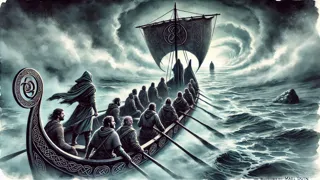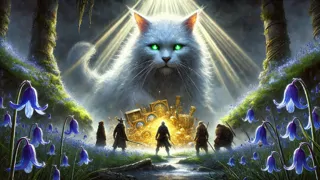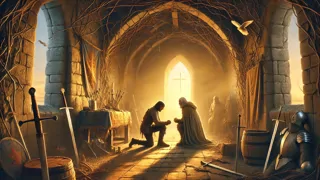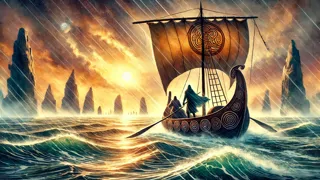Introduction
In the far west of Ireland, where the green headlands tumble into the restless Atlantic, stories still ride the salt-laden winds. Among the most haunting is that of Mael Duin, a youth born of sorrow and destiny. Raised by a noble foster family, Mael Duin grew up with a burning question in his heart—who was his true father? The answer would shape not just his fate, but the fate of those who sailed with him across seas unknown. Legends whispered of his father’s murder by pirates from a distant island, and the tale, once revealed, set Mael Duin’s course for revenge. Yet what began as a journey to avenge blood would become a voyage beyond vengeance—a crossing into realms of magic, terror, and wonder that would test every fiber of his courage.
The bards say that Mael Duin built his currach—its frame bound with leather, painted with ochre, and blessed by Druid hands—on a wind-swept shore. He would not go alone: his foster brothers joined him, fierce and loyal, as did three unexpected companions who leapt into the boat at the last moment, defying prophecy and forever altering the journey’s course. The sea itself seemed to awaken at their passage, waves swelling with promise and threat.
The horizon beckoned, and soon Mael Duin and his band set out across the deep, guided by omens and the song of the wind. What followed was a journey like no other—each island they landed upon brought new wonders and terrors. Giant ants, glass mountains, living silver, and islands where laughter meant death or food appeared at a thought. The sea became a threshold between Ireland and the Otherworld, where rules of life and death no longer held sway. And in each trial, Mael Duin was forced to question the nature of justice, forgiveness, and the ties of kinship that bind us through all storms.
The voyage of Mael Duin endures not only as a story of adventure, but as a mirror for the soul. It asks: is it enough to avenge a wrong, or must we seek to heal what’s broken in ourselves? As Mael Duin’s ship cut through silver mists and golden light, it charted a course through grief, hope, and the magical possibilities that lie beyond the edge of the known world.
The Prophecy Broken: Setting Sail Beyond Vengeance
Mael Duin’s childhood was a tapestry woven from fragments—memories of laughter in his foster home, flashes of grief in his mother’s eyes, and the unspoken ache of not knowing his true kin. It was only on his coming-of-age that his mother, Niamh, led him beneath the yew trees and told him the truth. His father had been Ailill Ochair Agha, chieftain of a small island, murdered by marauders who burned his fortress to the ground. Mael Duin’s blood sang with the need for justice. The Druids, consulted with solemn ceremony, gave clear instructions: "Take but seventeen companions. Depart not from the number. Only then will you return safely."

With sacred numbers set, Mael Duin gathered his foster brothers—Aed, Dorn, and Cuill—each brave and bound by loyalty. They worked for weeks to build their currach, stretching oxhide over light ash ribs, painting the hull with spiral knots and protective runes. When the tide was right, Mael Duin lifted a sprig of rowan for luck, and they slid the currach into the Atlantic. Just as the boat caught the outgoing tide, three foster brothers of lesser kin—Brian, Murcha, and Dermot—rushed from the dunes and leapt aboard, refusing to be left behind.
The prophecy was broken in a heartbeat. The Druids’ warning echoed in Mael Duin’s mind, but the sea had already claimed them. At first, the voyage was bright and bracing, with laughter over fresh-caught fish and songs echoing across the waves. But soon, the wind shifted. The horizon grew strange. On the third day, a thick, silver mist rolled in, swallowing the sun. The sailors lost all sense of direction, and their world shrank to the creak of leather, the salt sting on their skin, and the sound of unseen water lapping against the hull.
When the fog lifted, they saw the first of many islands—a stark place with black cliffs and cawing birds. Here, they found only the bones of past voyagers, and the bitter taste of fear. But Mael Duin pressed on, his resolve hardening. They sailed from island to island, each stranger than the last. On one, a fortress rose from the sea, its walls made entirely of glass. Inside lived a giant with a single eye who hurled boulders at their boat. On another, they encountered swarms of ants the size of cats, their mandibles sharp as daggers, forcing a frantic retreat.
The companions soon realized the sea was no ordinary expanse. Each island seemed to exist outside time and reason—places where food fell from trees at a thought, where laughter became fatal, or where silver birds sang riddles that unlocked secret passages. On a sunlit shore covered in flowers, a kind woman offered them honeyed bread and soft beds, but Mael Duin sensed the trap beneath her kindness. He kept the company moving, for every gift in the Otherworld carried a price.
The hardships mounted. The three unbidden companions quarreled, blaming each other for their plight. The original foster brothers grew weary, haunted by homesickness and dreams of drowning. Yet Mael Duin kept them together with stories of his father, reminding them that each trial brought them closer to justice—or perhaps, something greater.
Islands of Wonder and Terror: The Otherworld Unveiled
For weeks that melted into months, Mael Duin’s currach drifted through a shifting realm where logic twisted and the veil between worlds thinned. Each island emerged from the mist as if conjured by dream or nightmare—a world unto itself, governed by its own laws. On one, trees grew loaves of bread and rivers ran with mead; the companions ate their fill until laughter erupted uncontrollably. Suddenly, those who laughed too loudly fell motionless, their bodies seized by a magical sleep. Only Mael Duin’s caution saved the group, as he forced bitter herbs between their lips and pulled them back to the boat.

On another island, a mountain of gleaming crystal soared skyward, reflecting sunbeams in dazzling patterns. As they climbed to seek shelter, their own reflections mocked them from every angle, each one revealing secret fears and regrets. It was here that Brian, one of the unbidden foster brothers, nearly leapt to his death chasing an illusion of his lost childhood. Mael Duin caught him by the cloak, reminding him that the sea offered no mercy to those who lost hope.
Some islands brimmed with terror. On one, wolves with silver fur and burning eyes chased them back to the currach, teeth snapping inches from their ankles. On another, a fortress floated above the water, its gates guarded by warriors whose armor shimmered with living fire. The companions barely escaped by tossing food overboard as a distraction, their hearts pounding as flames licked the boat’s stern.
Yet wonder also flourished. There was an island where laughter healed every wound, and another where a gentle old woman spun tales of heroes long gone. Her words soothed the men’s fears, filling them with the strength to press on. In a meadow strewn with bluebells, they met children who danced on air, their feet never touching the grass. For a time, the voyage felt less like exile and more like an invitation to witness the limits of human imagination.
But always, the question of vengeance lingered. The companions quarreled over whether to continue their quest or seek a way home. Dreams grew troubled—visions of Ailill’s burning fortress haunted Mael Duin by night. Still, he pressed on. The ocean changed with their resolve; storms battered the currach, while at other times the sea shone like polished silver under a moonless sky.
The greatest test came on an island where a monstrous cat guarded a treasure. The beast’s eyes glowed green, its fur bristling with dark magic. Dorn, the boldest foster brother, tried to steal a gold necklace while the cat slept. In an instant, the creature sprang, its claws raking Dorn’s arm. Only Mael Duin’s quick thinking—throwing a handful of enchanted berries—saved his brother’s life. They escaped, wounded but wiser.
In each trial, Mael Duin’s leadership deepened. He listened to the warnings in the wind and began to sense which islands held danger and which offered grace. The companions learned to trust one another anew, forging a brotherhood tested by fear, hunger, and awe.
The Island of Forgiveness: Destiny Transformed
After many perils, the crew grew weary, their hearts heavy with longing for home and questions of fate. The sea seemed to sense their exhaustion, its moods shifting from gentle swells to sudden storms that battered the currach. Yet Mael Duin would not turn back—not until he found the island where his father’s killers dwelled.

One morning, as dawn bled rose and gold across the sky, an island appeared unlike any before. Its shores glimmered with black sand, and at its center stood a lonely tower wrapped in thorny vines. Approaching cautiously, the companions found the land silent except for the mournful cry of seabirds. As they climbed the winding path to the tower’s door, Mael Duin’s heart pounded—not with rage, but with a sorrow that surprised him.
Within the tower, they found an old man surrounded by relics of war—a rusted sword, a tattered banner, a carved wooden cup. The man knelt at an altar, praying for forgiveness. When he turned, his face was marked by grief and years of regret. He was the last surviving marauder, once a warrior of great pride, now broken by memory.
Mael Duin confronted him with trembling hands. He demanded justice for his father’s death, his voice echoing in the stone chamber. But as the old man spoke of regret, of comrades lost and families destroyed by vengeance, Mael Duin’s anger faltered. The crew waited in tense silence, their weapons drawn.
The old man offered no defense—only a plea for forgiveness. He spoke of nightmares that haunted him, of the emptiness that followed violence. Tears filled Mael Duin’s eyes as he realized that vengeance would not heal the wound in his soul. At that moment, he made a choice that would change his destiny. He sheathed his sword and knelt beside the man, offering forgiveness instead of death.
The air in the tower shifted—a heaviness lifted. The companions felt it too; a great weight eased from their hearts. Outside, the sea sparkled as if lit by a thousand suns, and a warm breeze swept through the vines. The old marauder wept with gratitude, blessing Mael Duin and his crew. They left the island with lighter spirits, the cycle of violence broken at last.
The return journey was no less magical. The islands they had once feared now welcomed them with gentle winds and clear skies. Food was plentiful, and their laughter was free from enchantment. Even the three foster brothers who had upset the prophecy found peace, reconciled with the rest. When at last the green hills of Ireland rose on the horizon, Mael Duin felt not just relief, but a sense of wholeness he had never known.
The voyage had transformed him and his companions. They brought back not just stories of marvels and monsters, but a hard-won wisdom—that courage is more than battle, and that the greatest victories are those won within the heart.
Conclusion
The story of Mael Duin’s voyage endures not just for its dazzling parade of wonders or its brush with terror, but because it illuminates something eternal in us all. Driven by loss and the need for justice, Mael Duin braved seas that defied reason and islands born from dream and dread. Each ordeal—whether fleeing monstrous cats, resisting deadly laughter, or facing visions of loss—tested more than his courage; it forced him to grapple with what it means to be human.
In forgiving his father’s killer, Mael Duin discovered the true heart of his quest: the possibility of healing over endless revenge. His journey home was no longer about escape or triumph, but about returning wiser and more whole. As the currach touched Irish shores again, Mael Duin and his companions knew they had crossed not just oceans, but the boundaries of their own hearts. Their story became a legend sung by bards for generations—a tale of peril and wonder, but above all, of the courage to choose mercy when anger calls for retribution.
So it is that the Atlantic winds still carry echoes of Mael Duin’s voyage. In every storm that breaks on Irish stone, in every sunrise that glows over distant waves, there lingers the promise that even in a world of danger and enchantment, compassion can chart a course home.


















